May 30th, 2018, 6:00 – 9:00 pm, at UCSF Mission Bay, Genentech Hall
Bay Area Microfluidics Network (BAM) successfully held its fourth event on May 30th, 2018, at the University of California, San Francisco (UCSF)’s Genentech Hall! The theme of the event was “Challenges in the Commercialization of Microfluidics.” BAM hosted the event in collaboration with the UC Berkeley-UCSF Bioengineering Association of Studies. We heard from three keynote speakers: Prof. Adam Abate from the Department of Bioengineering in UCSF, Dr. Barney Saunders, CEO of Purigen Biosystems, and Dr. Phil Spuhler, Lead Senior Bioengineer at BD Genomics. The three renowned speakers shared their perspectives on the challenges that microfluidics technologies may face for successful commercialization.
The pre-event networking started in the lobby of Genentech Hall at 6:00 pm. Industrial professionals, professors, graduate students and postdocs from several Bay Area universities arrived at the event from the far corners of the Bay Area. With a delicious Mediterranean buffet dinner, beer, and wine, participants enjoyed networking with other members of the microfluidics community.
At 6:30 pm, the event officially started. BAM’s co-founders, Thomas Carey and Yatian Qu, gave a brief introduction to themselves, BAM’s mission, the evening program and how to stay connected with BAM. Chris Mauracher, Managing Director of STRATEC Consumables, the event’s sponsor, spoke about STRATEC’s position and services in the microfluidics space.
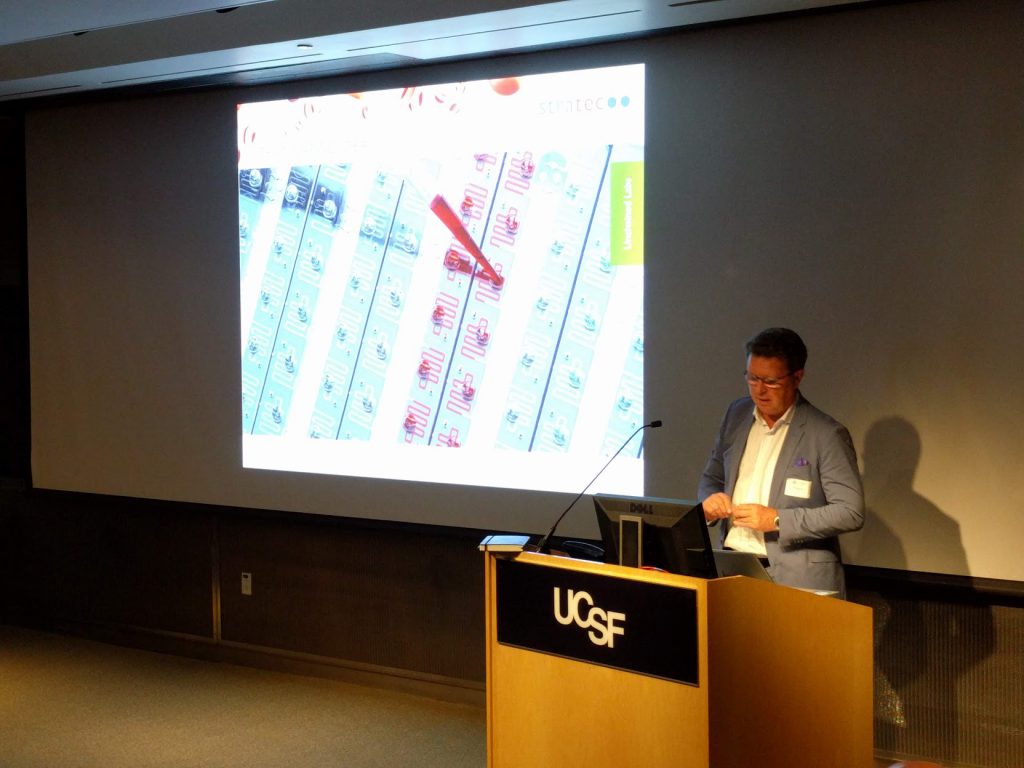
After the introduction by the organizing team and the message from the sponsor, the first keynote speaker, Prof. Adam Abate from UCSF, presented his group’s latest research on microfluidics-enabled platforms for single cell analysis and sequencing techniques and how he works simultaneously in academia and with microfluidic startup companies.
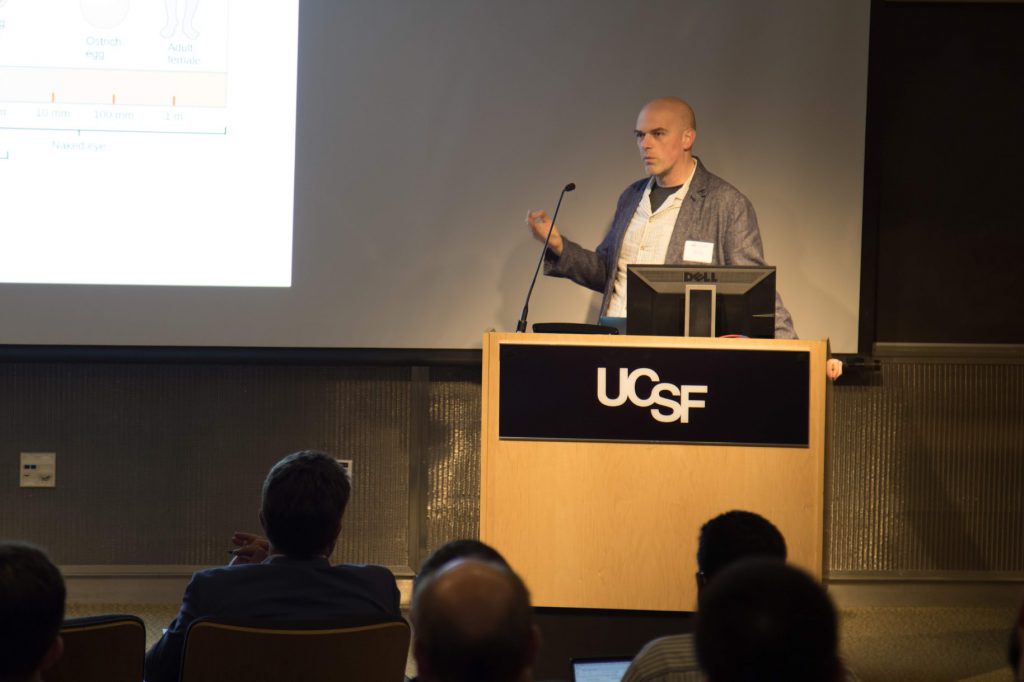
Following Prof. Abate’s talk, Dr. Barney Saunders shared his experiences of successfully commercializing seven different fluidic platforms. He emphasized the importance of moving to a “commercial-grade” chip as soon as possible and building a people-centered company culture.
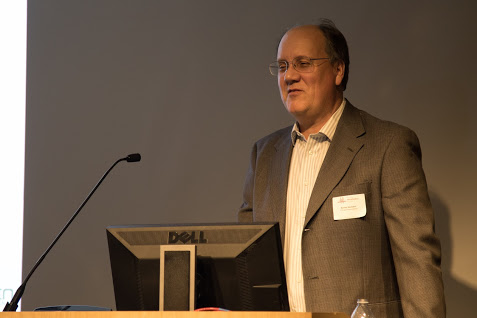
The third keynote speaker, Dr. Phil Spuhler from BD Gemonics, presented the commercialization process of two microfluidics products that he led. One is the BD Rhapsody Single-Cell Analysis System, a high throughput single cell genotyping platform, while the other is a microfluidic platform developed at Massachusetts General Hospital for the negative enrichment of circulating tumor cells from whole blood.
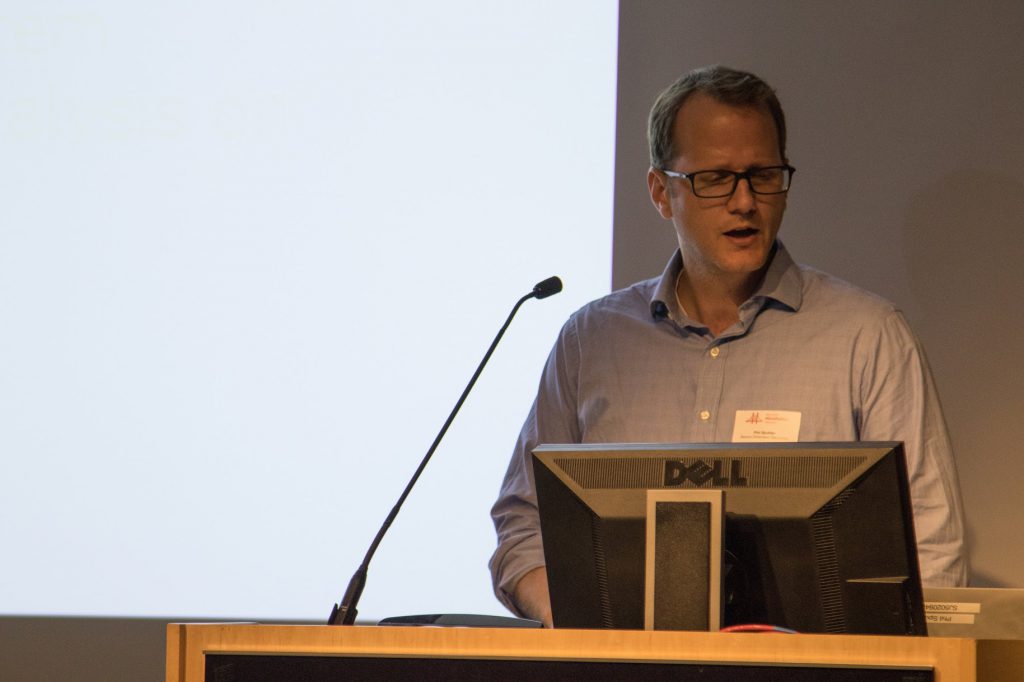
Following the three inspiring talks, Dr. Don Arnold, the CEO of Veristad (a technical and business consulting company) led a forty-minute interview-style discussion with the speakers. Dr. Arnold began by asking the three speakers deeper questions on challenges of commercializing microfluidic technologies. After stimulating the discussion, he invited the audience to participate in interactively. The audience asked questions such as when to introduce venture-backed funding and what the common frustrations are of working with a highly interdisciplinary team.
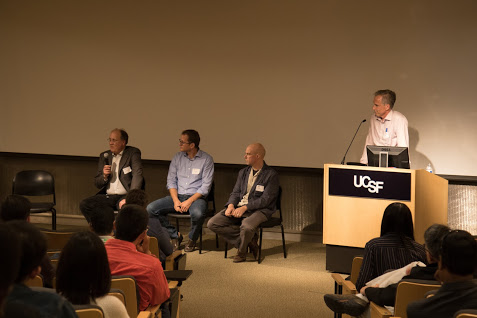
Following an insightful discussion between the speakers and the audience, the event ended around 9 pm. Participants enjoyed additional networking time with drinks afterwards at the Genentech Hall lobby.
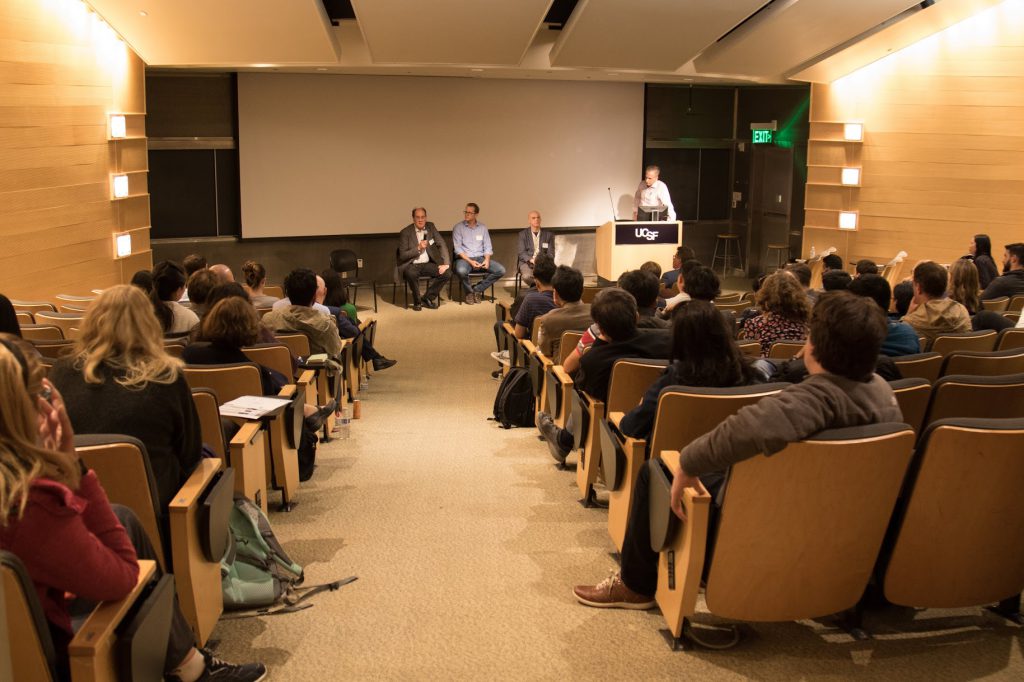
BAM’s “Challenges of commercialization” event at UCSF was another success. Attendees gave highly positive feedback and expressed a desire to participate in future events. Speakers also enjoyed the opportunity to present and the interactive discussion with the audience. BAM would like to thank STRATEC Consumables for sponsoring the event, Dr. Don Arnold for his invaluable efforts on moderating the discussion, the UC Berkeley-UCSF Bioengineering Association of Students for co-hosting and all the volunteers for helping with the logistics for the event.
February 1st, 2018, 6:00 – 9:00 pm, at Molecular Devices HQ in San Jose.
Time: 6:00 – 9:00pm
Location:Molecular Devices, 3860 N 1st St., San Jose, CA 95134
Program:
6:00 pm:
6:30 pm:
8:30pm:
On February 1st, Bay Area Microfluidics Network (BAM) held its third event, focused on the intersection of microfluidics & sequencing, at Molecular Devices’ new headquarters in San Jose. The event was co-hosted with the Microfluidics Consortium MF9.2 meeting. BAM invited Dr. Brian Yu from the Chan-Zuckerberg Biohub (CZ Biohub) and Dr. Rajiv Bharadwaj from 10X Genomics to speak about their latest research and product development and share perspectives on the opportunities and challenges of microfluidics-enabled sequencing technologies.
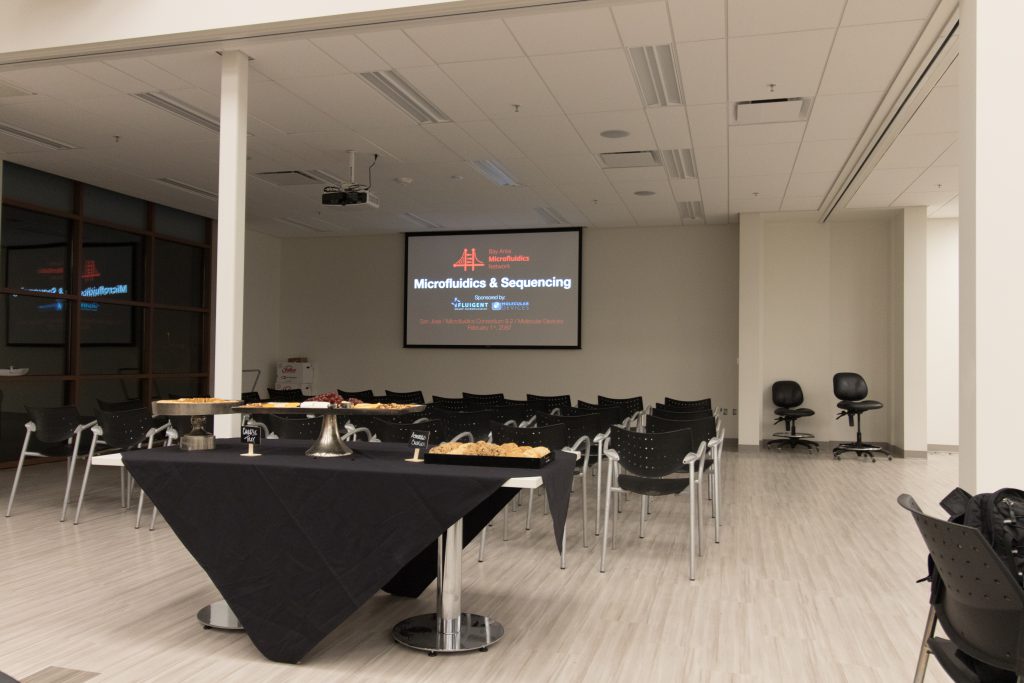
The night began with a hot buffet and networking in the newly furnished event center at Molecular Devices. Industrial professionals, postdocs, and graduate students from local universities including Stanford University, UC Berkeley, UCSF, and San Jose State University enjoyed the food, drinks, and meeting one another.
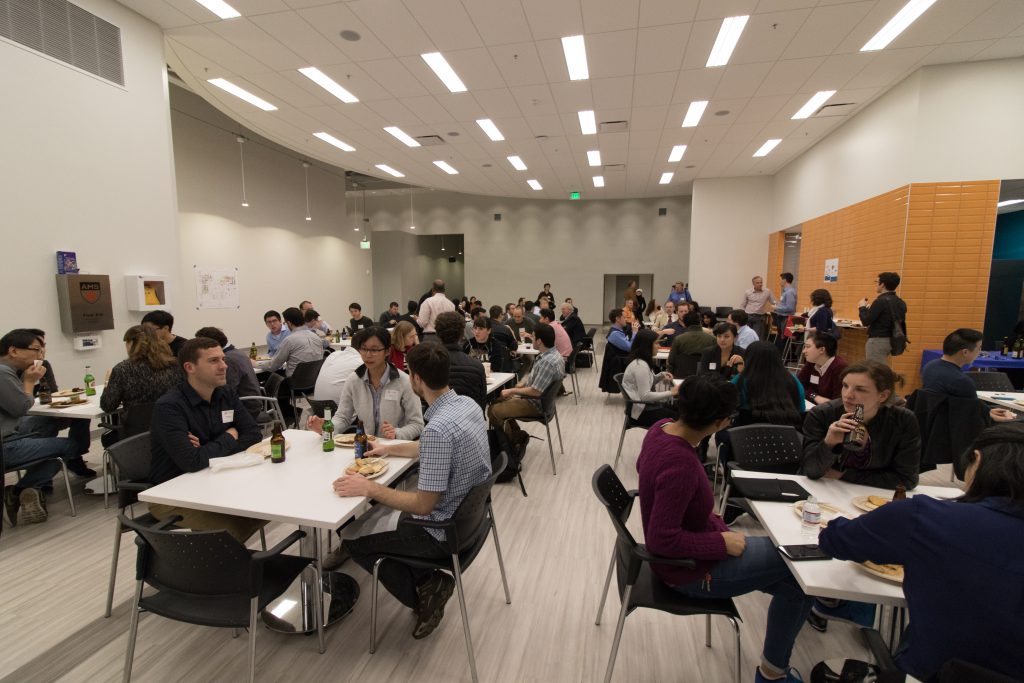
At 6:30 pm, BAM’s founding team members, Yatian Qu, Thomas Carey, and Calum Marrs gave a brief introduction to BAM’s organizing team, mission, the event program and how to stay connected with BAM. The event’s co-host, organizer of the Microfluidics Consortium MF9.2 meeting and the CEO of Center for Business Innovation(UK), Peter Hewkin, spoke about the achievements and plans for MF 9 serial meetings.
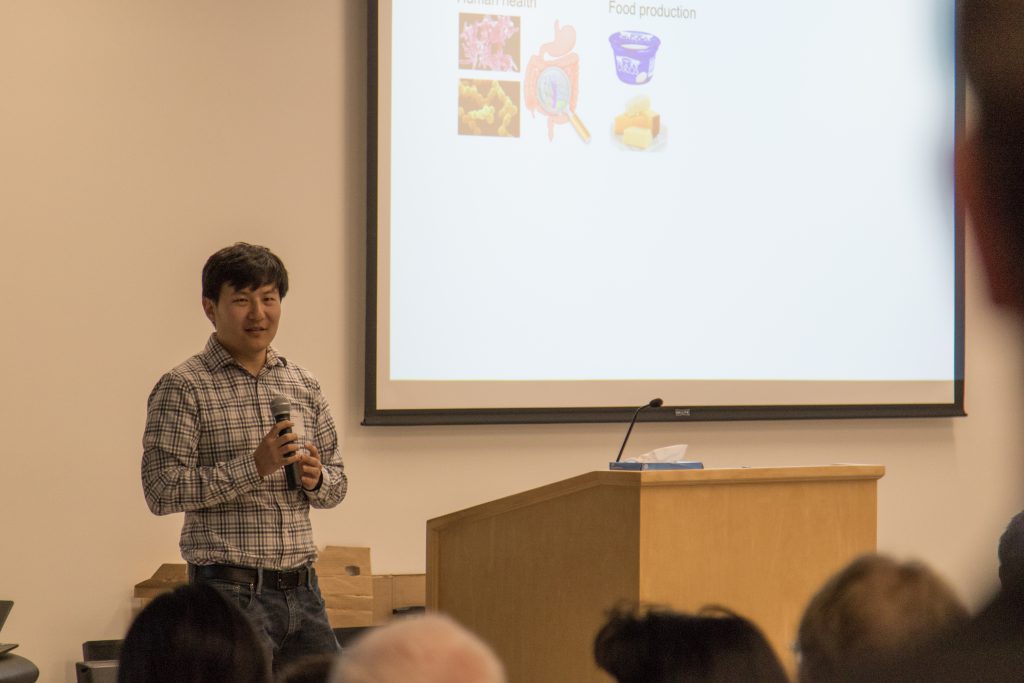
After the introductions by the organizing team, Dr. Brian Yu presented his work at CZ Biohub in a talk titled “Untangling metagenomes with microfluidics systems”. He first introduced CZ Biohub and the research initiatives in which the organization is interested. He then talked about his research on using microfluidic technologies to develop and optimize system-level methodologies to explore and to understand how microbial communities form, survive, evolve and remain robust in changing environments. After Dr. Yu’s presentation, Dr. Rajiv Bharadwaj gave a talk titled “Changing the definition of sequencing: drop by drop”. He introduced exciting production developments enabled by proprietary “GemCode Technology” (a microfluidics-based partitioning and barcoding technology) at 10X Genomics and their applications in genome/exome sequencing and single cell analysis.
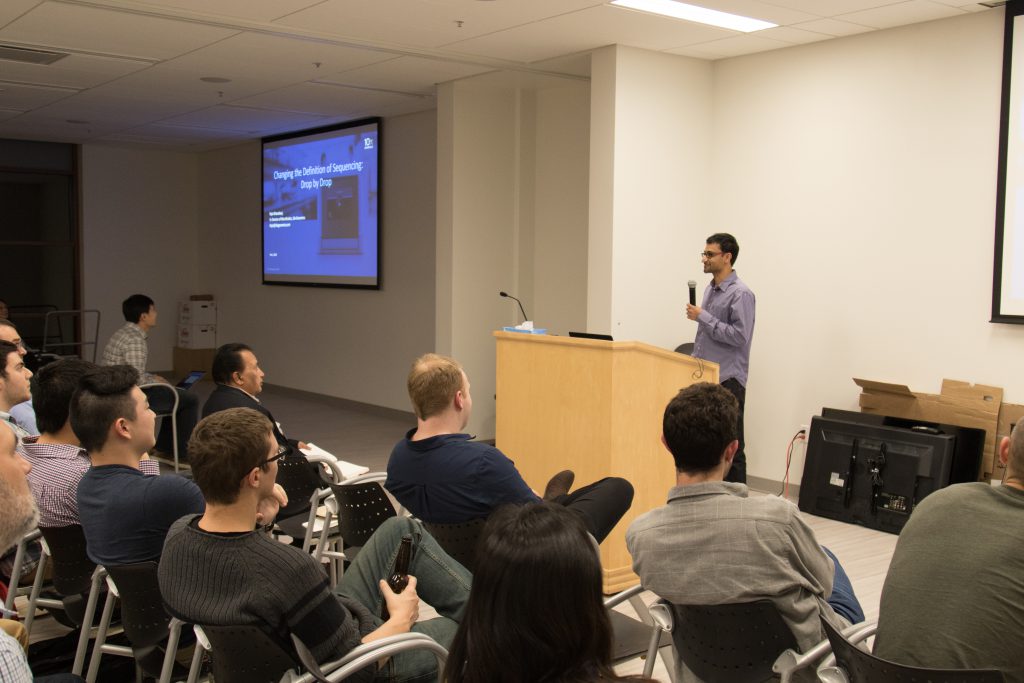
Inspired by the two presentations, Dr. Don Arnold, the CEO of Veristad (a technical and business consulting company), directed a forty-minute interview-style conversation with the two speakers. Dr. Arnold started by asking Dr. Yu and Dr. Bharadwaj deeper questions regarding their perspectives on microfluidic-enabled sequencing technologies and studies. He then invited the audience to participate in an interactive discussion.
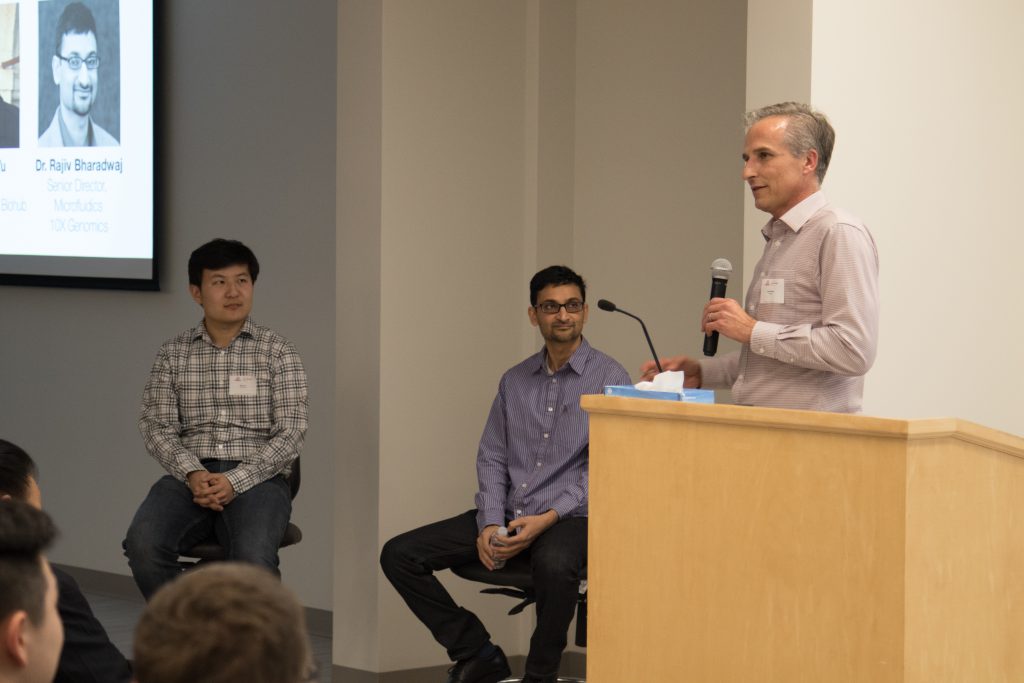
The event ended with a fruitful discussion between speakers and the audience, and participants enjoyed additional networking time with drinks at the event center.
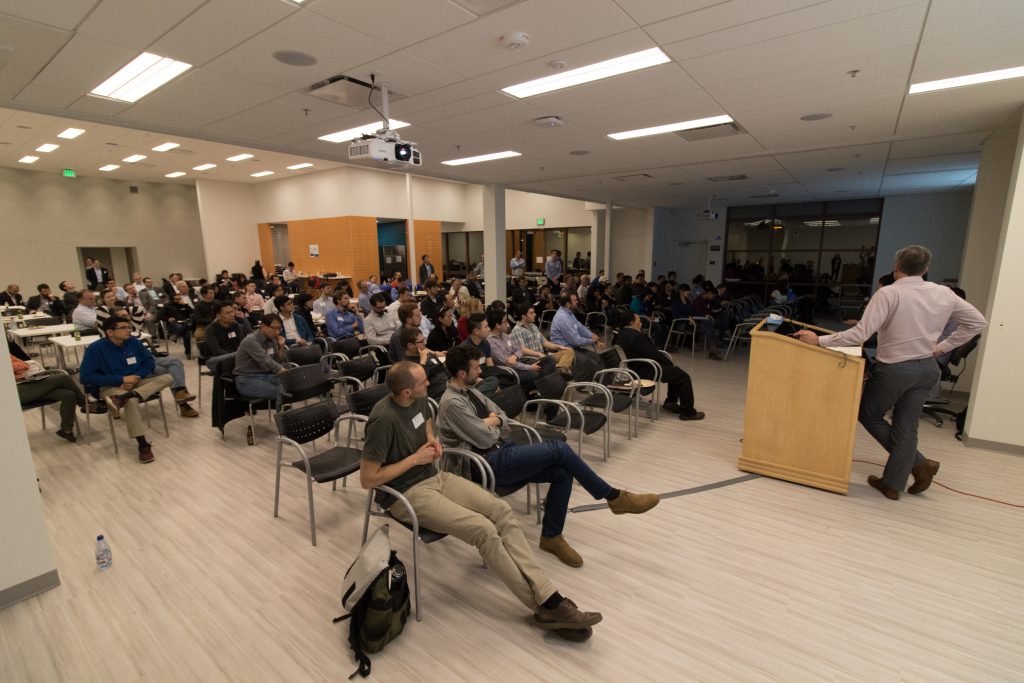
BAM’s Microfluidics & Sequencing event at Molecular Devices was a great success. Attendees gave highly positive feedback and expressed a desire to participate in future events. BAM would like to thank Fluigent and Molecular Devices for sponsoring this event, Dr. Don Arnold for his invaluable assistance with logistics, and the Microfluidics Consortium MF9.2 meeting for co-hosting and participating in the event.
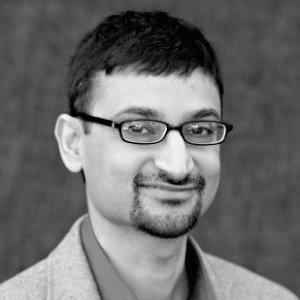
Dr. Rajiv Bharadwaj
Rajiv Bharadwaj is the Senior Director of Microfluidics at 10x Genomics. He leads a group of extremely talented engineering geeks to develop elegant products for single cell and genomics analyses. Rajiv earned his Ph.D. from Stanford University and has worked in the biotech industry for ten years with previous roles at Caliper Life Sciences.

Dr. Brian Yu
Dr. Brian Yu recently joined Chan Zuckerberg Biohub, where he works with faculties from Stanford, Berkeley, and UCSF to establish a microbiome initiative focused on understanding how microbial communities affect human health. Prior to joinging CZ Biohub, Brian obtained his B.S. in electrical engineering from Caltech and received his Ph.D. training at Stanford University under the joint supervision of Dr. Mark Horowitz and Dr. Stephen Quake. During his Ph.D., Brian developed a microfluidic-based metagenomic method and used it to identify novel microbial phylogenies from environmental samples. In addition to microfluidics and metagenomics, Brian was also involved in setting up automated liquid handling capabilities for a single-cell RNA-seq pipeline and became an expert in all steps of the high-throughput sequencing process, including sample preparation, sequencing, and bioinformatics analyses. Scientifically, Brian Yu is interested in developing and optimizing system level methodologies to explore and to understand how microbial communities form, survive, evolve, and remain robust in changing environments. In particular, he believes that microfluidic technologies offer unique advantages at various sample and library preparation stages. However, simple user experiences and robust operations are key technological challenges.
BAM hosted this event in collaboration with Microfludics Consortium 9.2:
This event was generously sponsored by:
December 7th, 6:30 – 9:00 pm, at University of California, Berkeley.
Time: 6:30 – 9:30pm
Location:Rm 106, Stanley Hall, UC Berkeley, Berkeley, CA 94720
Program:
On December 7th, Bay Area Microfluidics Network (BAM) held its second event at UC Berkeley! The event theme was Microfluidic Technologies for Single Cell Analysis. BAM invited Prof. Aaron Streets from the Department of Bioengineering at UC Berkeley and Dr. Troy Lionberger from Berkeley Lights to speak about their latest research and share perspectives on the opportunities and challenges of microfluidics-enabled single cell analysis.
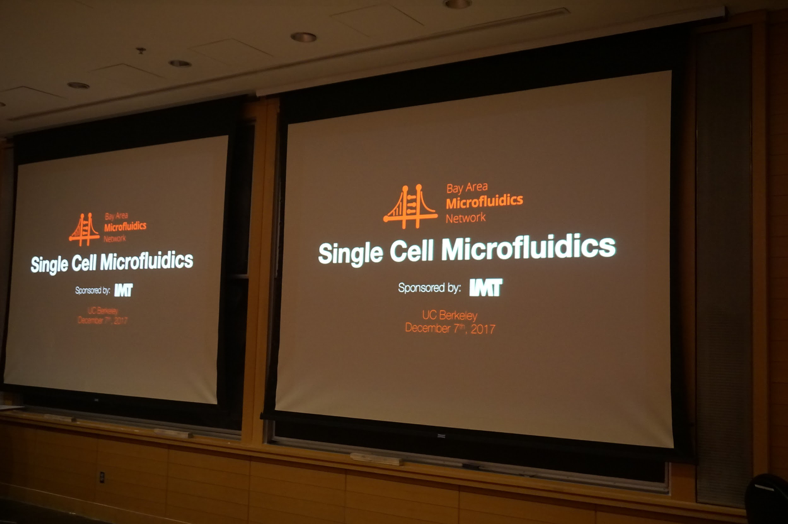
The night began with pre-event networking in the Stanley Hall atrium. Industrial professionals, graduate students, postdocs and faculty members enjoyed light refreshments, beer, and meeting one another.
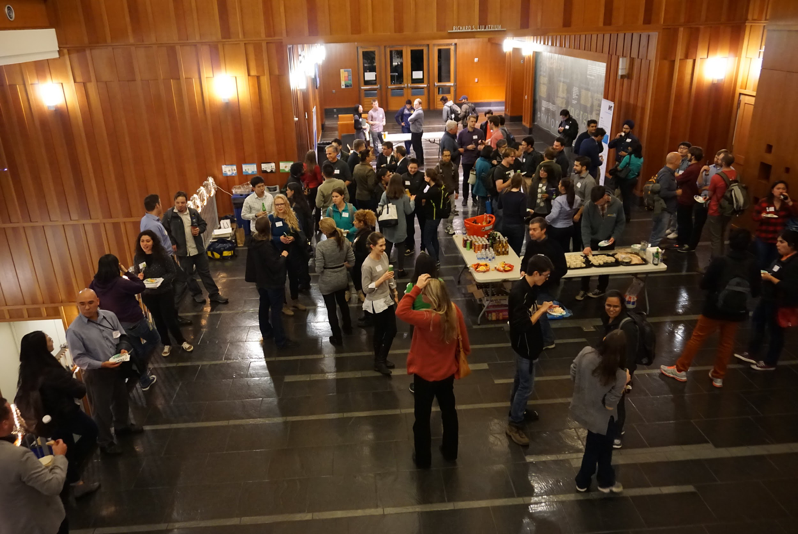
At 7:00 pm, BAM’s founding team members, Thomas Carey, Yatian Qu, and Calum Marrs gave a brief introduction to BAM’s mission, past events, the event program and how to stay connected with BAM. The event sponsor, Dr. Alexios Tzannis from IMT, then greeted the audience, introduced IMT and talked about their interest in microfluidics applications.
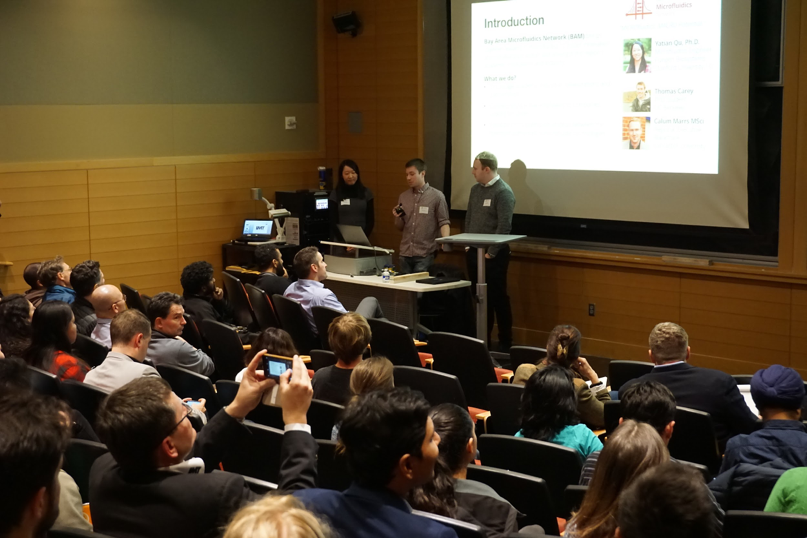
After the messages from the organizers and sponsor, Prof. Aaron Streets presented the microfluidic single cell research from his group in a talk titled “Microfluidics for assembling a human cell atlas.” He talked about combining Raman scattering microscopy and sequencing technologies to analyze morphology and genomic information of single cells that were captured by a microfluidics platform. After Prof. Streets presented the exciting examples of microfluidics-enabled single cell studies, Dr. Troy Lionberger gave a talk titled “The Berkeley Lights Beacon: A high-throughput, single cell platform for accelerating discovery and development.” He presented an autonomous microfluidic single cell platform developed by Berkeley Lights and its applications in accelerating the discovery and development in antibody therapies.
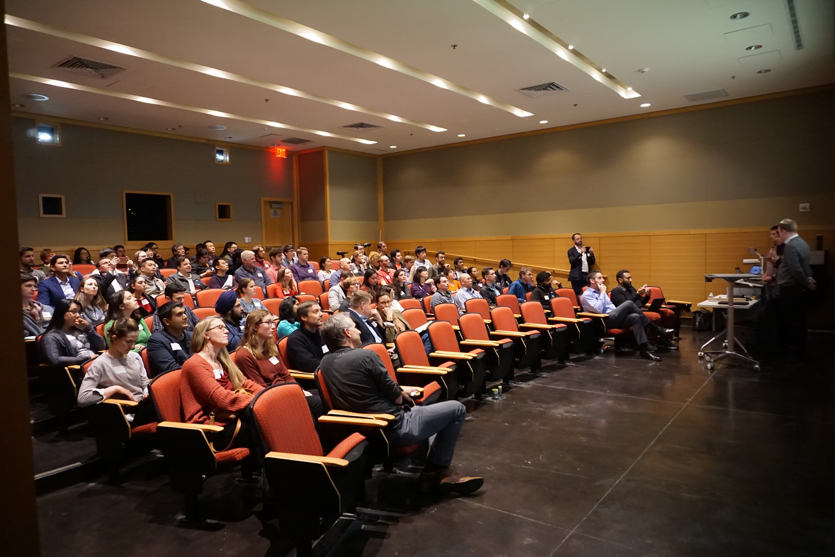
Inspired by the two presentations, Dr. Don Arnold, the CEO of Veristad (a technical and business consulting company), directed an interview-style conversation with the two speakers. Dr. Arnold started by asking Prof. Streets and Dr. Lionberger deeper questions regarding their perspectives on microfluidic single cell analysis platforms. He then invited the audience to participate in an interactive discussion.
The fruitful discussion between speakers and the audience lasted for about thirty minutes. The event ended with a “job board” where two startups, Indee Labs and Elegen, introduced themselves and presented job opportunities. After their pitches, participants enjoyed additional networking time in the atrium of Stanley Hall.
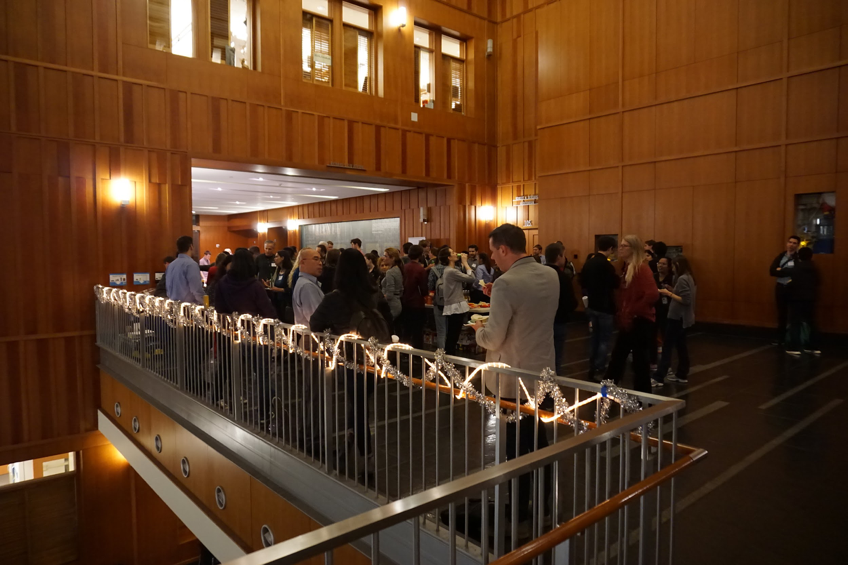
BAM’s single-cell analysis event at UC Berkeley was a success. Attendees gave highly positive feedback and expressed a desire to participate in future events. BAM would like to thank IMT for sponsoring this event and the volunteers that helped with event logistics.
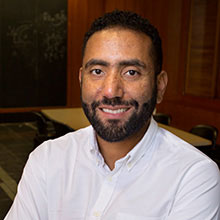
Prof. Aaron Streets
Aaron Streets completed his Bachelor’s at UCLA in Physics and his PhD at Stanford in Applied Physics with Dr. Stephen Quake. He then went to Beijing, China as a Whitaker International Postdoctoral Fellow and worked with Dr. Yanyi Huang in the Biodynamic Optical Imaging Center (BIOPIC) at Peking University. Streets joined the faculty of UC Berkeley as an Assistant Professor in Bioengineering in 2016 and is currently a core member of the Biophysics Program and the Center for Computational Biology. He is also a Chan Zuckerberg Biohub investigator. The Streets Lab is interested in building tools to study biology at the single-cell level. Research focuses on the development of three core technologies to facilitate quantitative measurements of single cells: microfluidics, non-linear optical microscopy, and genomics. Streets’s goal is to incorporate advancements in these three areas in order to probe many facets of cellular phenotype and reveal correlation between protein-DNA interaction, gene expression, protein expression, chemical composition, and morphology. Technology developed in the Streets lab aims to facilitate the construction of a comprehensive Human Cell Atlas.

Dr. Troy Lionberger
Troy Lionberger is currently the Senior Manager of Technology Development at Berkeley Lights, a startup in Emeryville that has created a unique microscopy platform that couples optical cell positioning with microfluidics to drive high-throughput screening of clonal cell populations. Dr. Lionberger’s team at Berkeley Lights has invented many novel assays that exploit the unique nature of mass transport at the microfluidic scale; these assays are currently being deployed on applications ranging from therapeutics and synthetic biology to food technology. Prior to entering industry, Dr. Lionberger was a biophysics postdoc through the Howard Hughes Medical Institute at U.C. Berkeley in the lab of Prof. Carlos Bustamante, where he developed high-precision microscopy techniques to study the nanoscale translocation of individual molecular motor proteins. His graduate training includes a Ph.D. in Cellular and Molecular Biology and an M.S. in Mechanical Engineering, both from the University of Michigan. Dr. Lionberger’s entry into microfluidics research began as an undergraduate researcher under Dorian Liepmann at U.C. Berkeley, where he earned a B.S. in Bioengineering and a B.A. in Molecular and Cell Biology.
BAM would like to thank IMT for their generous sponsorship of our single-cell microfluidics event.
Time: 6:30 – 8:30pm
Location: Stanford Medical School, Alway M106 (300 Pasteur Dr, Palo Alto, CA 94304)
Program:
On August 24th, Bay Area Microfluidics Network (BAM) successfully had its inaugural event at the Stanford University School of Medicine. Nearly a hundred participants attended the event, including graduate students and postdocs from Stanford University, UC Berkeley, and San Jose State University and many working professionals from local biotech companies and startups.
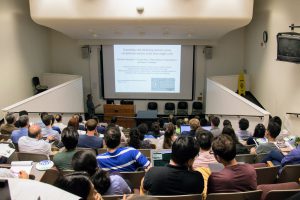
The inaugural event started with an introduction of BAM by the founding team, Yatian Qu and Thomas Carey. Founded in early 2017, BAM aims to bring together leaders in microfluidic technologies in the Bay Area to foster innovation and collaboration.
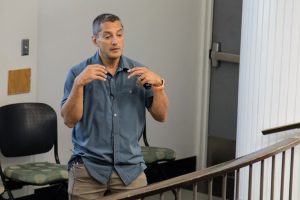
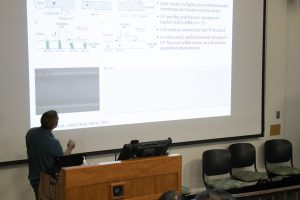
After a brief introduction, Prof. Juan Santiago (Mechanical Engineering, Stanford University) presented the latest research from his group on “Separating and analyzing nuclear versus cytoplasmic nucleic acids from single cells”. As the audience learned about promising applications of microfluidics, the Sr. Manager of Scientific Research at Illumina, Dr. Tarun Khurana, presented on “Microfluidics Technologies for DNA Sequencing Applications”.
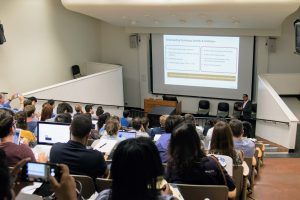
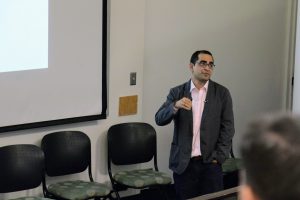
Inspired by talks by renowned experts in microfluidics, the audience participated in an interactive panel discussion on “Recent advances, applications and challenges in Microfluidics”. The discussion was moderated by Dr. Lewis Marshall, manager and lead engineer at Purigen Biosystems. During the discussion, Prof. Juan Santiago, Dr. Tarun Khurana, Ms. Lu Zhang (founder and managing partner of Fusion Fund) and Dr. Joshua Cardiel (Sr. Mechanical Engineer in Berkeley Lights) shared their perspectives on current challenges and opportunities, especially in technology development, commercialization and investment in the microfluidics space.
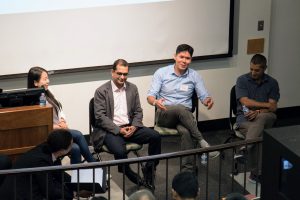
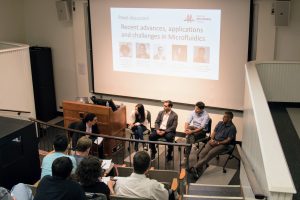
The inaugural event ended with a fruitful discussion between the audience and the speakers. Many participants mingled and stayed late after the event to share thoughts, opinions and ideas. Many attendees also expressed a high interest for BAM’s future events.
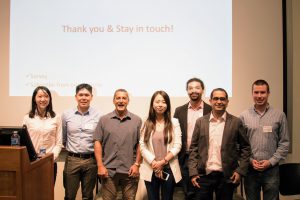
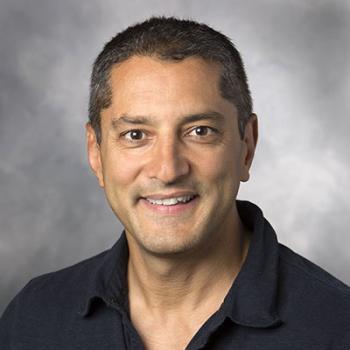
Juan SantiagoJuan Santiago received his MS and PhD in Mechanical Engineering from the University of Illinois at Urbana-Champaign in 1995. His research includes the development of microsystems for on-chip chemical and biochemical analysis, methods for sample preparation, miniature pumps, and electric-field based deionization methods. Applications of this work include genetic analysis, drug discovery, portable power generation, and the production of drinking water. Among other recognition, he was awarded a National Science Foundation Presidential Early Career Award for Scientists and Engineers (PECASE) (’04) and the Outstanding Achievement in Academia Award by the GEM Foundation (’06). He is a Fellow of the American Physical Society, a Fellow of the American Society of Mechanical Engineering, an Associate Editor of the journal Microfluidics and Nanofluidics, co-founder of several companies in the microfluidics area, co-inventor of micron-resolution particle image velocimetry (Micro-PIV), and director of the Stanford Microfluidics Laboratory. He has served as Associate Editor of the journal Lab on a Chip (’08-’13). Santiago has given 25 keynote and named lectures and more than 100 additional invited lectures. As one measure of impact, his work is cited about 1000 times per year (Scopus h index of 43, and Google Scholar h index of 52). He has graduated 24 PhD students and advised eight postdoctoral researchers. 16 of his former advisees are now professors at major universities. He has authored and co-authored over 150 archival publications and 200 conference papers, and holds 34 patents.

Lu ZhangLu Zhang is the Founding and Managing Partner of Fusion Fund (A.K.A. NewGen Capital). Prior to starting Fusion Fund, she was a Venture Partner at Fenox Venture Capital. She participated in over 20 investments and assist M&A of the portfolios. Lu was also the Founder and CEO of a start-up focused on non-invasive technology for the early diagnosis of Type II diabetes (acquired in 2012). Lu received her M.S. in Materials Science and Engineering from Stanford University and holds several patents. She is an advisor and mentor to several innovative programs and incubators in Silicon Valley. Lu has won numerous awards and is frequently invited to speak at events. She was awarded the Forbes US 30 under 30 & Featured as the Honoree of VC category. She was also awarded the Forbes Asia 30 under 30 of Finance category in the same year. She was recently awarded as the T&C 50 Modern Swans Influencer, representing top female entrepreneurs in US.
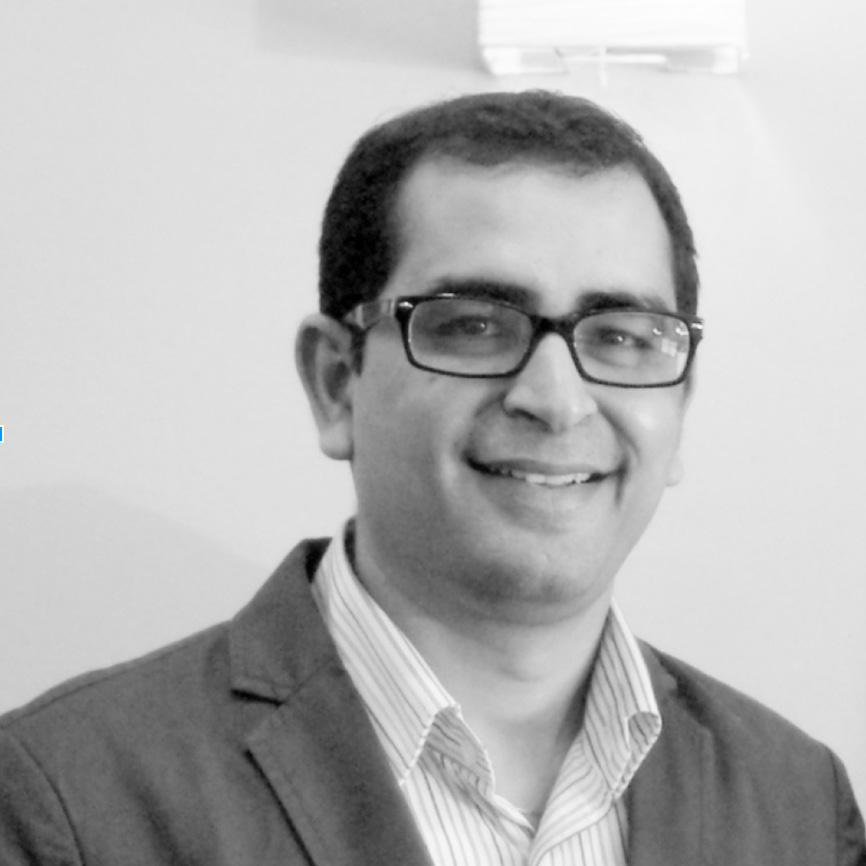
Tarun KhuranaDr. Tarun Khurana is a Senior Manager in the Scientific Research division at Illumina Inc where he leads the Advanced Fluidics Technologies group. His research focuses on application of advanced microfluidics technologies such as electrowetting-on-dielectric (EWOD) based droplet manipulation, two-phase droplet microfluidics and inertial microfluidics to develop novel tools for DNA extraction, library preparation and single-cell analysis via DNA sequencing applications. Prior to working for Illumina, Dr. Khurana worked for Avantome, a startup developing pyrosequencing based DNA sequencing platform. Dr. Khurana completed his PhD in Mechanical Engineering from Stanford University in 2008 with focus on microfluidic electrophoresis methods for high sensitivity analytical detection and has developed over 25 patented or patent-pending technologies.
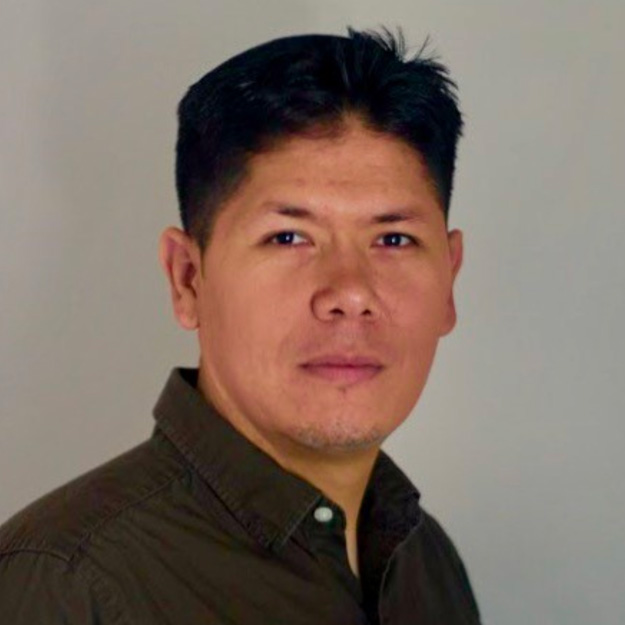
Joshua Cardiel Joshua Cardiel is currently working as a Sr. Mechanical Design Engineer-Microfluidics in the R&D team at Berkeley Lights Inc. He received a Ph.D. in Mechanical Engineer and Nanotechnology from the University of Washington in Seattle. His doctoral research focused on experimental studies of microfluidic-based synthesis of nanostructures. He held postdoctoral positions at the National Institute of Standards and Technology (2016) and University of California in San Francisco (2015), where he studied droplet microfluidics to produce libraries of biopolymer nanostructures for biotechnology applications.
BAM would like to thank Dolomite Bio for their generous sponsorship of our inaugural event and volunteers that helped with event logistics.
